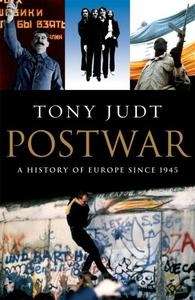Post War

Editorial William Heinemann
Fecha de edición octubre 2005
Idioma inglés
EAN 9780434007493
896 páginas
Libro
encuadernado en tapa dura
Resumen del libro
Tracing the story of post-war Europe and its changing role in the world, Judt's magnificent history of the continent of our times investigates the political, social and cultural history of Europe from the wreckage of post-war Europe to the expansion of the EU into the former Soviet empire. Judt's stress is on the continent as a whole, from Greece to Norway, from Portugal to Russia.
This, uniquely, is a hstory that pays due attention to both Western and Eastern Europe, to cultural and social developments as to political and diplomatic events. Throughout Judt shows how politics, society, culture and popular culture influenced each other. A masterly and definitive history of our continent in a crucial period of its history, Europe in our time.
Biografía del autor
x{0026}lt;P x{0026}lt;B Tony Judt x{0026}lt;/B (Londres, 1948-Nueva York, 2010) realizó sus estudios en el King's College de Cambridge y en la École Normale Supérieure de París. Impartió clases en las universidades de Cambridge, Oxford, Berkeley y Nueva York, y en esta última ocupó la cátedra de Estudios Europeos, que él mismo fundó en 1995, y fue director del Remarque Institute.Entre sus publicaciones cabe destacar x{0026}lt;I El peso de la responsabilidadx{0026}lt;/I (Taurus, 2014), x{0026}lt;I ¿Una gran ilusión?x{0026}lt;/I (Taurus, 2013), x{0026}lt;I Pensar el siglo XXx{0026}lt;/I (Taurus, 2012), x{0026}lt;I El refugio de la memoriax{0026}lt;/I (Taurus, 2011), x{0026}lt;I Algo va malx{0026}lt;/I (Taurus, 2010), x{0026}lt;I Sobre el olvidado siglo XX x{0026}lt;/I (Taurus, 2008), x{0026}lt;I Pasado imperfectox{0026}lt;/I (Taurus, 2007), x{0026}lt;I Postguerrax{0026}lt;/I (Taurus, 2006), considerado uno de los diez mejores libros de 2005 por la x{0026}lt;I New York Times Book Reviewx{0026}lt;/I , galardonadocon el Premio Council on Foreign Relations Arthur Ross y finalista del premio Pulitzer, y x{0026}lt;I Cuando los hechos cambianx{0026}lt;/I (Taurus, 2015). Judt colaboró en diferentes medios de Europa y Estados Unidos, como x{0026}lt;I The New York Review of Booksx{0026}lt;/I , el x{0026}lt;I Times Literary Supplementx{0026}lt;/I o x{0026}lt;I The New York Timesx{0026}lt;/I . En 2007 recibió el Premio Hannah Arendt, y en 2009 el Orwell Prize for Lifetime Achievement. Falleció en agosto de 2010 a causa de una enfermedad degenerativa.x{0026}lt;/P








